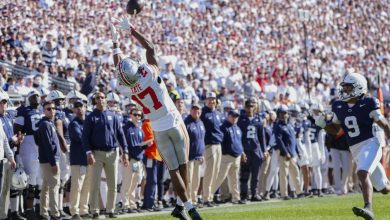According to an NCAA analyst, “They make you fight and elbow.” Tennessee’s strategy during Johni Broome’s comeback game against Auburn

In the world of college basketball, every game is a chance for a new chapter to be written, a story to unfold, and for teams to make their marks on the national landscape. When Tennessee and Auburn squared off recently, it wasn’t just another game; it was a statement match, a showdown between two SEC powerhouses, each vying for supremacy in a conference that has seen a remarkable rise in competition in recent years. The game, however, had an additional layer of intrigue—Johni Broome, the Auburn star, was coming off a significant injury, and Tennessee’s defense was ready to make his comeback as difficult as possible.
According to NCAA analysts and scouts, Tennessee’s defense against Broome was a masterclass in physicality. “They make you fight and elbow,” one analyst noted, encapsulating the Volunteers’ approach to stopping one of the SEC’s brightest talents. Broome, who had been an offensive and defensive force for Auburn all season, was a focal point for the Tennessee defense, and the Volunteers’ strategy to stifle him was aggressive, relentless, and ultimately designed to test Broome’s resolve after his injury.
This article delves into Tennessee’s defensive game plan during Broome’s comeback game against Auburn, analyzing how they aimed to neutralize the star forward and what it meant for both teams. From physical play to strategic adjustments, we break down how Tennessee’s defense tried to disrupt Broome and how Auburn responded to the challenge.
The Importance of Johni Broome to Auburn’s Success
Before we dive into the specifics of Tennessee’s defense, it’s important to understand why Johni Broome is so crucial to Auburn’s success. After transferring from Morehead State, Broome quickly established himself as the centerpiece of Auburn’s game plan. With a well-rounded skill set that includes scoring, rebounding, and shot-blocking, Broome has been the team’s go-to player in nearly every situation.
Offensively, Broome has the ability to score both inside and outside, making him a versatile threat. His footwork in the post is excellent, and he’s capable of drawing fouls and finishing strong around the basket. Additionally, Broome’s ability to hit mid-range jumpers and stretch the floor has made him an even more dangerous player. But Broome’s impact isn’t limited to just offense. His defense is where he truly shines, as his length and athleticism allow him to guard multiple positions, and his ability to block shots is a significant asset for Auburn.
In short, Broome is the anchor of Auburn’s offense and defense, and his health and performance are key factors in the Tigers’ success. With that in mind, when Broome made his return to action after an injury, it was clear that Tennessee would try to make his life as difficult as possible. The Volunteers knew that neutralizing Broome would be key to their chances of securing a victory.
Tennessee’s Defensive Strategy: “They Make You Fight and Elbow”
Tennessee is known for its tough, physical defense. Under head coach Rick Barnes, the Volunteers have built a reputation as one of the most relentless teams in college basketball. Barnes’ defensive system is centered around pressuring the ball, contesting every shot, and wearing down opponents with an aggressive, in-your-face style of play. It was no surprise, then, that the Volunteers’ strategy against Broome would be one of physicality.
“They make you fight and elbow,” the NCAA analyst noted, capturing the essence of Tennessee’s approach. From the moment Broome set foot on the court, the Volunteers were ready to engage in a battle for every inch of space. Tennessee’s defenders were tasked with using their physicality to force Broome into uncomfortable positions, whether that meant crowding him in the post, denying him touches on the perimeter, or getting into his body to disrupt his rhythm.
One of the key components of Tennessee’s defensive scheme was to prevent Broome from getting into a flow early in the game. By making him work for every touch, the Volunteers sought to wear him down physically and mentally. Broome, who thrives in transition and quick offensive sets, was forced to fight through constant ball pressure and double-teams. Tennessee’s defenders were aggressive with their positioning, often forcing Broome to take contested shots or pass the ball to teammates.
Physical Play in the Paint
One of the most notable aspects of Tennessee’s defense against Broome was their emphasis on physicality in the paint. Broome, who is known for his ability to dominate inside, faced a wall of Tennessee defenders every time he ventured near the basket. The Volunteers deployed a strategy that involved heavy body contact, bumping Broome with every movement, and making sure he felt the pressure as he tried to operate in the post.
Tennessee’s defenders, led by their imposing frontcourt players, made it clear that they would not give Broome an easy path to the basket. Every time Broome touched the ball in the low post, he was met with a wall of defenders. The Volunteers’ big men, including the likes of Uros Plavsic and Jonas Aidoo, used their size and strength to wear Broome down, fighting for position and making it difficult for him to get clean looks at the rim.
This physicality also extended to the way Tennessee defended Auburn’s pick-and-roll plays, which are a staple of the Tigers’ offense. When Broome set screens for his teammates, Tennessee’s defenders were quick to hedge and switch, making sure that Broome could not slip unnoticed to the basket. By disrupting Auburn’s offensive flow and forcing Broome to operate in tight spaces, Tennessee’s defense made it nearly impossible for Broome to get into a rhythm.
Denying Broome in Transition
One of Johni Broome’s greatest strengths is his ability to get out in transition, using his athleticism to score in fast-break situations. Auburn thrives on pushing the pace, and Broome is often the beneficiary of quick, up-tempo plays that allow him to showcase his speed and finishing ability.
Tennessee, however, was determined to limit Broome’s impact in transition. The Volunteers are known for their high-intensity defensive style, and they made sure to crash the boards hard and prevent Auburn from getting out on the fast break. When a shot went up, Tennessee’s defenders boxed out, ensuring that Broome couldn’t get easy run-outs or second-chance opportunities.
In addition to limiting Auburn’s fast breaks, Tennessee also employed a strategy to ensure that Broome could not get easy looks in transition. When Broome did grab a rebound and look to push the ball, Tennessee’s defenders were quick to sprint back and contest any attempt he made to get to the rim. By slowing down Auburn’s pace and forcing Broome to play in a half-court setting, Tennessee was able to stifle some of Broome’s greatest strengths.
Tennessee’s Double-Teams and Help Defense
Another key element of Tennessee’s defense against Broome was their use of double-teams and help defense. When Broome had the ball in the post, the Volunteers were quick to send an additional defender to double him, making it difficult for him to get off a clean shot or find an open teammate. Tennessee’s defenders worked in unison, rotating quickly to trap Broome and force him into difficult decisions.
The Volunteers’ help defense was also crucial in preventing Broome from finishing strong at the rim. When Broome made a move toward the basket, Tennessee’s defenders were quick to collapse, challenging his shots and contesting every attempt. The physicality of the double-teams and the constant pressure on Broome forced him into uncomfortable situations, leading to several missed shots or turnovers.
Broome’s Resilience and Auburn’s Response
Despite the intense physicality of Tennessee’s defense, Johni Broome’s resilience was evident throughout the game. Even when faced with double-teams and constant pressure, Broome fought through the adversity, showcasing his toughness and determination. While his numbers may not have been as gaudy as they were in other games, Broome’s impact on the game went beyond the box score.
Broome’s ability to stay composed under pressure was crucial for Auburn. He didn’t let the physicality of Tennessee’s defense throw him off his game, and he continued to make plays for his teammates. His leadership on the court was evident as he made crucial passes, grabbed key rebounds, and played strong defense. Even when he wasn’t scoring, Broome’s presence was felt on both ends of the floor.
Auburn’s response to Tennessee’s strategy was also impressive. The Tigers adapted to Tennessee’s physicality by spreading the floor and moving the ball quickly. With Broome drawing attention from multiple defenders, Auburn’s other players had opportunities to step up and make plays. Players like Allen Flanigan, Wendell Green Jr., and Jaylin Williams took advantage of the openings created by Broome’s presence on the court, helping to keep Auburn in the game despite Tennessee’s aggressive defense.









